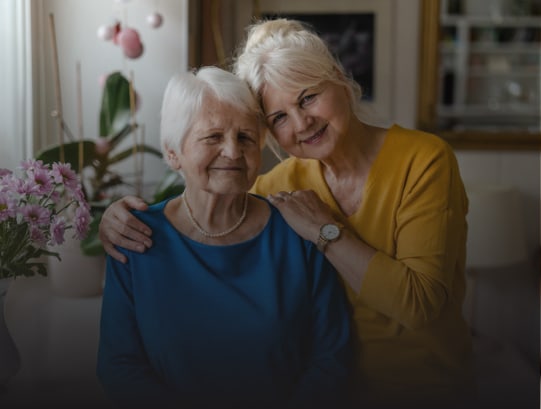When a loved one is diagnosed with dementia, it can feel like you’re in unfamiliar terrain. However, it doesn’t have to stay that way—help is always available. With understanding, compassion, and self-education, you can effectively communicate with your loved one and preserve your bond. But how?
Make sure to minimize distractions, practice patience, use simple language, and stay positive. Dementia is complex, but communication is still possible. You can also reach out to a memory care community near you to seek out professional support.
What Is Dementia?
Dementia is a broad term. It’s used to describe a range of different symptoms and conditions that affect cognitive function.
There are several types of dementia. These include:
- Alzheimer’s disease
- Vascular dementia
- Lewy body dementia
- Frontotemporal dementia
- Mixed dementia
These progressive conditions damage cells throughout the brain. They’re much more common in older adults—most types of dementia become more likely to develop after the age of 65. No matter the specific type, dementia is an extremely complex condition that affects everybody a little differently.
Why Dementia Causes Communication Difficulties
Dementia is well-known for its effects on a person’s memory. As brain cells degenerate, it leads to plenty of symptoms:
- Difficulty with problem-solving
- Confusion with time and place
- Changes in mood or behavior
- Poor or decreased judgment
- Withdrawal from social activities
However, one effect often overlooked is how it damages a person’s communication abilities. It becomes more difficult to express thoughts or follow a conversation. This can quickly lead to frustration for the person and their family alike.
Tips for Communicating with Someone with Dementia
When you’re trying to communicate with a loved one living with dementia, you’ll need to make some adjustments. It all starts with understanding what they’re going through.
First, think about the basics of human conversation. We don’t just exchange words—we need to:
- Follow patterns
- Use our memory
- Recognize body language
- Maintain attention
- Be patient and adaptive
These are much more challenging when dementia is at play. It’s essential to think about where your loved one is coming from. Then, you can change your approach and work towards strengthening your bond. Communication is still possible—you’ll just need to make some small changes.
Minimize Distractions
When dementia is a factor, it’s easy to get distracted. You should start by trying to minimize any distractions in the environment during your conversation. Try to:
- Turn off the television
- Mute any background noise
- Reduce clutter or busy patterns in the room
- Ensure proper lighting to help with visibility
- Choose a quiet and familiar place
This creates a conducive space for meaningful conversation. Then, during the conversation, try to keep distractions to a minimum. Maintain eye contact and focus on your loved one’s words. T
Be Patient
Patience is a valuable tool when speaking to someone with dementia. Your loved one will likely need extra time to process information and respond to you. Don’t rush them, cut them off, or finish their sentences.
Give them the space to express themselves at their own pace. This creates a safe environment where they won’t feel rushed or frustrated. Instead, you’ll show them that their thoughts and feelings still matter. This can go a long way in strengthening your connection.
Use Simple Language
Another effective strategy is to prioritize using simple, clear language. Keep your sentences brief and to the point, avoiding complex vocabulary that might lead to confusion.
Make a point to speak slowly at all times, but don’t talk down to them. Just avoid complex thoughts that link together, as these are a fast route to confusion and frustration. Instead, use a warm and reassuring tone to help them feel at ease.
Remember, communication is more than just words. Your tone and facial expressions play a significant role in helping them feel connected. By simplifying your language and maintaining a compassionate outlook, you’re giving your loved one a comforting space where they can thrive.

Stay Positive
Maintaining a positive attitude is crucial. Your loved one likely feels frustrated about the situation, and they’re going to rely on you for support. Try to approach every conversation with warmth and kindness.
It helps to focus on what your loved one can still do rather than what they may not. Celebrate the little things and the moments of connection. This gives a sense of accomplishment to you both and brings joy back to the conversation.
Remember—optimism is often contagious. By staying positive, you’re helping maintain an environment where open communication is celebrated.
Helping a Loved One with Dementia
Communicating with someone with dementia requires patience and an open heart. By focusing on empathy and understanding, you can create meaningful moments and strengthen your bond together. At The Bridges at Warwick, we know how complicated these conditions can be. In our Lilac Trace Memory Care lifestyle, we’re ready to help your loved one in their everyday life. Contact our team for more information, or schedule a visit with us today to see for yourself.









